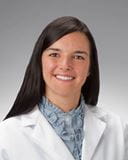Voiceover: This podcast is for informational and educational purposes only. It is not medical care or advice. Clinicians should rely on their own medical judgements when advising their patients. Patients in need of medical care should consult their personal care provider. Welcome to "That's Pediatrics", where we sit down with physicians, scientists, and experts to discuss the latest discoveries and innovations in pediatric healthcare.
Dr. Arvind Srinath: From UPMC Children's Hospital of Pittsburgh, welcome to That's Pediatrics. I'm your co-host Arvind Srinath from the division of gastroenterology.
Dr. Amanda Poholek: And I'm your co-host Amanda Poholek from the division of pediatric rheumatology.
Dr. Srinath: Our guest today is Dr. Katherine Kate Watson. Dr. Watson is the co-director of the pediatric residency program at our hospital, a practicing general pediatrician and assistant professor of pediatrics. She's a strong advocate for child wellbeing both in an outside and inside the office setting. She has focused her academic work on addressing childhood obesity, especially in highest risk populations.
In the clinic, she works with families to prevent and manage obesity by promoting breastfeeding, training residents to counsel effectively about health behaviors, and spearheading clinical food insecurity projects. The topic of today is Pittsburgh pediatrician training.
Dr. Watson, what drew you to Pittsburgh after training at Duke?
Dr. Kate Watson: Oh, it was an easy choice to come to Pittsburgh after my training at Duke. So I grew up in the Western Pennsylvania area and having the opportunity to join colleagues in general academic pediatrics that were passionate about care for the underserved patient population in greater Pittsburgh was what drew me here and it is still those colleagues and those relationships that allow me to feel so fulfilled in my clinical work here in Pittsburgh. Being able to make an impact for families that are in the highest need patient group and training residents to provide care for patients who have been historically marginalized in medicine is really just so wonderful from clinical care and education side.
Dr. Srinath: That is amazing. And that word collegiality really rings true for all of us. Can you give us an overview of the clinical training residents receive in your residency program?
Dr. Watson: So our clinical training in our categorical pediatrics training program is a three year training period and we are a coronary care center here. And so our residents spend a good amount of time learning pediatrics at the bedside in Children's Hospital of Pittsburgh both in the emergency department, the inpatient primary or pediatric hospital medicine wards and also the subspecialty care on the inpatient side.
We also have a really rich longitudinal primary care track for residents that spans the three years of their residency training, both at the primary care center in Oakland and Turtle Creek which are two of our academic sites. And then we are partnered with 30 primary care sites in the greater Western Pennsylvania area. Many of whom are led by Children's Hospital of Pittsburgh alumni that are passionate about education and continue to want to give back to the children's hospital education mission. And so our residents have amazing care in the emergency department, on the inpatient wards, and then through longitudinal primary care and community embedded experiences.
Dr. Srinath: That is a huge breadth of training with such depth and catchment. Are there tracks that residents can specialize amidst that huge breadth of training?
Dr. Watson: There are, we have several different paths for our residents here in Pittsburgh. And so we have a path focused on our PALS track, which focuses on pediatrics, advocacy, leadership, and service. That's also a three-year track that runs alongside of our categorical track, focusing more on the care for the underserved. And so those residents have carved out protected time for six weeks in both their intern, second year, and third year in primary care in underserved areas in Western and central Pennsylvania.
We have a specialized track for pediatric anesthesiology which is a five-year combined track in partnership with anesthesiology at UPMC. We have a triple board track, which is pediatrics, psychiatry, and child and adolescent psychiatry, which is a five-year combined track.
We have a track in child neurology and neurodevelopmental disabilities which is a five-year track in collaboration with child neurology. We have a scientist development track which is a six-year track that runs alongside our pediatric track and guarantees fellowship placement at an amazing fellowship here within UPMC Children's Hospital of Pittsburgh.
And we are looking to expand some of those sub-specialty tracks and combined tracks in the coming years. So currently those are our tracks but that is looking for expansion over the next two years.
Dr. Srinath: That's a lot of opportunities.
Dr. Poholek: Yeah, that's amazing. I, as many of our listeners know, I'm the researcher portion of this co-host team. And so I'm really curious about any opportunities that any of the residents have for getting involved in any kind of research as part of their training, whether that's clinical or even potentially more basic if they're interested in that kind of a genre.
Dr. Watson: So we are very focused on supporting and developing research skills in our residents. And because of that, all of our residents in those combined tracks that you just heard about and our categorical peds track have a one-week research elective during their intern year to foster relationships with mentors in research whether that be translational research, basic science research, or clinical research that they hope to do while a resident here in Pittsburgh.
Understandably, our scientist development track has very rich mentorship and more longstanding research embedded within their tracks. But all of our residents engage in research at some level that really starts in the intern year, continues to build through second and third year with the hope for academic productivity and dissemination both in the local and national level during their residency training.
Dr. Poholek: Oh, that's awesome. That's really amazing to hear.
One of the things that I was thinking about as you were chatting, and it's just how, you know, the last few years have had increasing challenges, right. And particularly advances in medicine have really been moving at a rapid pace, a rapid pace.
So what kind of challenges has that given you as a residency training program? And can you comment a little bit on how you train your residents in the basic skills, but also empower them to really keep on top of those, those rapid advances in medicine?
Dr. Watson: So I will say that the last two years has taught us that we need to be change accepting and education looks so different now than it did two and a half years ago. We've been able to stand up virtual education options and platforms that have allowed for education not only here at our hub in Lawrenceville but also for residents that are rotating on some of those primary care electives, out in the community. And it's allowed us to take a step back and say where are our foundational needs in primary care and in pediatrics to build from that foundation up?
And so we've continued to engage and build bridges with our community, allowed our residents to engage in those activities and really created a space for advocacy. Our job, as leaders, I think in the residency training program is to support and nurture those advocacy initiatives and research initiatives in our trainees. They all come to us with amazing skills and we hope to nurture those skills during the three years so that those muscles have only become stronger in their training period. And through that, I think we've been able to engage in some of the changes in education on the hospital side and in the community side, along with forming rich partnerships with researchers, such as you and other amazing researchers here at Children's Hospital of Pittsburgh to allow our residents that are more interested in the basic science research to continue to grow those skills in times that they weren't able to be as clinically engaged at the bedside as they had been previously.
Dr. Srinath: So along the lines of research and mentorship, speaking of Dr. Poholek here, can you talk about opportunities that residents have pursued to pursue their passions like nationally, for example, in organizations?
Dr. Watson: So we are really excited that our residents have taken their passions here in Pittsburgh and been able to advocate not only in the city level but the state level and nationally, an organization such as the American Academy of Pediatrics and some of the subspecialty-focused training pathways or subspecialty focused pathways for engagement at the national level. And so residents have not only led workshops, presented posters, and had platform presentations at these workshops, but really have been engaged as leaders in resident and fellow focus groups at the national level that have focused on work that we are doing right here in Pittsburgh around diversity, equity, and inclusion and forming partnerships with the community to allow others to learn from what's happening here and from our residents to bring back amazing things that are happening at other institutions to continue to grow programs here.
Dr. Poholek: Fantastic. I was wondering if you could share a little bit about what happens after residency. Where do our residents end up, what kind of careers do they pursue? Some of the ones that end up in those very important sub-specialty trainings that you talked about? You know, what does it look, what does the future look like for those folks as well?
Dr. Watson: So about 2/3 of the residents that choose to pursue residency training here in Pittsburgh pursue fellowship training in a pediatric sub-specialty, a little less than 1/3 go into primary care. Primary care had included pediatric hospital medicine until just recently when they became fellowship certified. And so many of our residents thankfully choose to stay here in the greater Pittsburgh area and primary care and serve the community that they have become so passionate about during residency. And we are lucky enough to be able to retain many of our residents as amazing fellows here at Children's Hospital of Pittsburgh and also send them to some of the most highly regarded children's hospitals in the country for those fellowship training.
We're trying to encourage mentorship and underrepresented subspecialties such as rheumatology and pulmonology, such that we can continue to meet the needs of children and families not only here in Pittsburgh, but across the country. And so we're anxiously engaging in mentorship and some of those underrepresented fellowship subspecialties with the hope of meeting the demand that is there. And we are always excited to match residents in pediatric intensive care and neonatal intensive care cardiology and some of the more highly sought after fellowships.
Dr. Srinath: You know, that was a great segue to look into the future. Can you tell us about some future plans that you guys have for the residency program?
Dr. Watson: So we are excited over the last 12 months to have partnered with Carnegie Mellon School of Business and the learning and development team here at UPMC to develop a leadership training program for our residents that really focuses on their leadership development while in residency. And we know that residents come to Children's Hospital of Pittsburgh with amazing leadership skills, but sometimes haven't had the opportunity to formalize those trainings with classroom or didactic workshops.
And so this training is longitudinal focused on assessment of self as a leader, leading a team in the second year and then leading within an institution. And so we're excited about what curriculum will come out of that and stronger relationships from the Children's Hospital of Pittsburgh executive team with our resident learners within the hospital, and think that this will be a really exciting opportunity for our residents to continue to develop those skills during their three to six year residency training here in Pittsburgh. And I'm excited that the fellowships have also embraced that leadership development. And so I think we have always known that Pittsburgh pediatricians are leaders. Now we will have more developed skills in those areas for them to go out and lead in Pittsburgh and around the country. We do think that there is gonna be a greater need for community engagement for our residents and advocacy work to be done along with cutting edge discovery.
And so we hope to continue to foster educational initiatives in both of these areas to allow our residents to build skills during residency so that they can go out and serve and be the innovators and part of research teams that are making discoveries that will likely make children's lives better in the future.
Dr. Poholek: That's really interesting. I hadn't considered sort of thinking about training physicians to be leaders. I'm wondering if you can actually dive in a little bit more on that. Why do you think leadership skills is something that's so important in every physician?
Dr. Watson: So physicians and pediatricians are called upon to be leaders in their clinical care and in individual patient encounters with families. And these are skills that we are never trained on during medical school or our undergrad training unless someone specifically seeks that out.
And so how do you train someone to be an excellent communicator in difficult communication situations? How do you train someone to build a team and harness the value of all of those team members to propel the team forward? How do you push a team to meet goals and be able to assess those goals for their impact on outcomes?
And so we look through knowing more about yourself, your leadership skills, and your strengths that you bring to the team as a building block in the first year of the training and really focusing on emotional intelligence and those skills that all of us innately bring to the table and then building in second year on leading a team and our residents have ever changing teams. They are called to lead teams that change every single week and then become faculty members that have a team that changes on the inpatient side weekly to monthly.
And so these skills are ever evolving and being able to allow that resident to set goals, assess those goals as they've evolved throughout the week, and then provide timely and meaningful feedback to the team will not only allow that team to be medically successful in delivering care but also successful in the model of healthcare delivery. And so we really think that this will set our residents apart as they go on in futures as leaders in medicine.
Dr. Poholek: That's amazing, what an innovative approach, I love it.
Dr. Srinath: Can we close with what you're most proud of with your residency program?
Dr. Watson: I'm most proud of the people that we recruit here. I will say I am humbled to be able to lead such an amazing group of residents with Andy Nowalk. It is truly the joy of our service here in Pittsburgh is to lead our residents in the residency training program. We have the opportunity to recruit some of the most amazing clinicians but even more amazing humans.
And so I will say I learn from them every day. I am humbled by the care that they provide. And when I am out in the community and wearing my UPMC Children's Hospital garb and stop by a family that says, oh my nephew or niece was just at Children's Hospital and they had such amazing care. I know that it's one of our residents that was on the other end of that care. And it makes me incredibly grateful for the opportunity to lead such a wonderful group.
Dr. Srinath: That's amazing. That's amazing. Thank you, Dr. Watson, it's been a pleasure.
Dr. Watson: Thank you. Thank you so much.
Dr. Poholek: Thank you so much for coming today and sharing these really valuable insights to the pediatric residency training program here at UPMC Children's Hospital. We so appreciate your time and everything that you do for the residents here.
Dr. Watson: I couldn't be more thrilled to be able to talk with you about the amazing residents that we have here in Pittsburgh. Thank you so much for having me.
Dr. Srinath: Thanks.
Voiceover: You can find other episodes of "That's Pediatrics" on iTune, Google Play Music, and YouTube. For more information about this podcast or our guests, please visit chp.edu/thatspediatrics. If you've enjoyed this episode, please be sure to rate, review and subscribe to keep up with our new content. You can also email us at podcast.upmc@gmail.com with any feedback or ideas for topics you'd like our experts to cover on future episodes. Thank you again for listening to "That's Pediatrics." Tune in next time.











